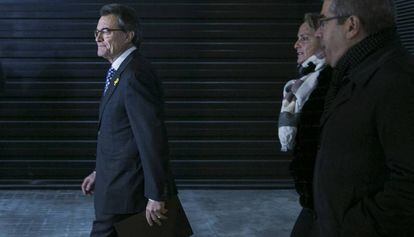Catalan independence icon Artur Mas steps back from political front line
Former premier denies decision to resign as president of PDeCAT party linked to current drift of affairs

On Tuesday, two well-known leaders of the Catalan separatist movement decided to leave the political front line.
The first of these is former Catalan premier Artur Mas, under whose tenure (December 2010-January 2016) the region’s dominant Democratic Convergence of Catalonia (CDC) party, now rebranded PDeCAT, embraced the separatist cause.
First comes the country, then the party and finally the person
Artur Mas
Mas announced on Tuesday that he is stepping down as president of PDeCAT to devote himself to his own legal defense and to “clear the way for new leaderships.”
Mas organized a non-binding independence referendum in November 2014, a move that triggered legal action against him by the Spanish justice system. In March of last year, he was barred from office for two years over that vote, and he still has pending legal issues in connection with the case.
Meanwhile, former Catalan justice department chief Carles Mundó, of the Catalan Republican Left (ERC), said he was giving up his deputy’s seat for “personal reasons.”
Puigdemont
While both men sought to underscore that their decisions have nothing to do with the current state of Catalan politics, Mas made a statement that could be construed as veiled criticism of Carles Puigdemont, his successor in the premiership. Puigdemont is currently living in self-imposed exile in Brussels after pushing a unilateral independence declaration through the Catalan parliament last October and being subsequently ousted by Spain’s central authorities using emergency powers to restore legal order in the region.
“First comes the country, then the party and finally the person,” said Mas, apparently alluding to the personality cult that has sprung up around Puigdemont, who has been portraying himself as an illegally deposed democratic leader.
But at a packed news conference at party headquarters on Tuesday, Mas sought to dispel the notion that he was drifting away from PDeCAT’s current project for Catalonia.
Mas’ decision comes two years after he also stepped aside to allow Puigdemont to become the new Catalan premier
“This can in no way be construed as a distancing,” he said. “Rather, on the contrary.”
Puigdemont ran in the recent Catalan elections of December 21 even though he said on Tuesday that “it is not possible to return to Catalonia,” as he would be arrested in connection with a criminal investigation into rebellion and sedition. In spite of this, ERC sources said on Wednesday the party had agreed to “look into the [legal] viability” of his bid to become the new premier, even if this entails a long-distance investiture session whether via video link or another person reading a speech on his behalf. Although the pro-unity Ciudadanos party won the most votes and the most seats at the election, the sum of separatist forces is sufficient for a parliamentary majority.
Mas has said in recent weeks that while the outcome of the December 21 election is “an enormous success,” it is still not enough to “accelerate the implantation of independence in the short run. And everyone has understood this.”
Asked how he felt about the possibility of having a long-distance government leader operating out of Brussels, Mas deflected the question: “You have to ask him. I won’t be the one to give advice to Puigdemont, much less in public.”
Palau case
Mas’ decision to step down comes exactly two years after he also stepped aside to allow Puigdemont to become the new Catalan premier following the snap election of September 2015. Mas himself had called this election in the hopes of obtaining an absolute majority. Instead, he lost seats and was forced to seek support for his Junts pel Si coalition from the radical far-left CUP party, who had one condition: to find a different leader, as Artur Mas’ name was too closely associated with corruption cases involving his CDC party.
Mas denied any connection between an upcoming court ruling and his decision to leave PdeCAT
Next Monday, a court will unveil its decision regarding the “caso Palau,” a corruption case involving the Palau de la Música concert hall, embezzlement and illegal party funding. A construction company, Ferrovial, allegedly paid €5.5 million in kickbacks to secure public works contracts, and disguised these payments as donations to the Palau.
On Tuesday, Mas denied any connection between this upcoming ruling and his decision to leave PdeCAT. He noted that the case goes back to the 1990s, when he was not yet the Catalan premier – although he was the right-hand man to longtime leader Jordi Pujol.
Mas was neither investigated nor called in as a witness in the Palau case.
English version by Susana Urra.













































